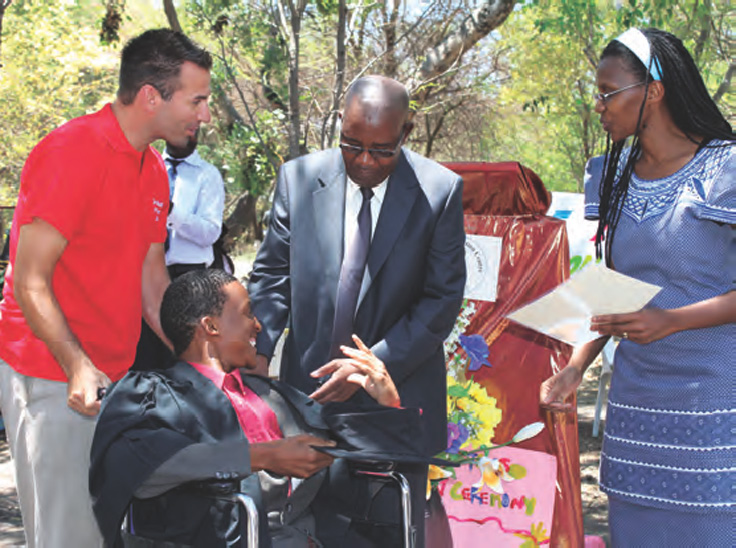13.10 Postscript: Where Are They Now?
DEFYING STIGMA: ROSS LEARNS TO THRIVE
 After graduating from high school, Ross started college at American University in Washington, D.C. But he didn’t have much of a plan for managing his disorder. “What I did was essentially the equivalent of showing up to college in a wheelchair, and hoping they would have ramps,” he recalls in his book Behind Happy Faces (Szabo & Hall, 2007, p. 100).
After graduating from high school, Ross started college at American University in Washington, D.C. But he didn’t have much of a plan for managing his disorder. “What I did was essentially the equivalent of showing up to college in a wheelchair, and hoping they would have ramps,” he recalls in his book Behind Happy Faces (Szabo & Hall, 2007, p. 100).
Three weeks into freshman year, Ross had his stomach pumped for alcohol poisoning and, within 2 months, a major relapse with bipolar disorder. He returned to Pennsylvania and was hospitalized. After this, Ross felt like a failure: “I used to sleep on my couch for 18 hours a day or sit out in my backyard and stare out at nothing,” he remembers. “I felt like bipolar disorder had won out, and that there was nothing more I could do about it” (Szabo & Hall, 2007, p. 101).
But then Ross did something. He found employment and began taking classes at a community college, which led to his enrollment at a local four-year college. Eventually, he returned to American University to finish what he had started 4 years before. Unfortunately, drinking alcohol was still a big part of his life. One night, after downing multiple shots of liquor, Ross passed out cold. He awoke 22 hours later, looked in the mirror, and started to weep. “Okay. ENOUGH. You are either going to continue this pattern and DIE, or you are going to make a change,” Ross remembers thinking to himself. “I chose to change that night, but change isn’t easy. It isn’t quick—and it isn’t fun” (Szabo & Hall, 2007, p. 102).

What followed were years of hard work. Ross quit using alcohol and caffeine and smoking cigarettes and marijuana. He imposed structure on his life, waking up and going to sleep at the same time each day, eating regular meals, and exercising. He started being open and honest in his relationships with friends, family, and his therapist. And most important, he confronted his self-hatred, working hard to identify and appreciate things he liked about himself. Says Ross, “I had to learn to care enough about myself to want to change.”
Although Ross had been taking medication and seeing psychotherapists for years, treatment alone wasn’t the answer. “What was missing was me being an active member in my treatment,” he says, “and doing things outside of treatment [to get better].”
In 2002 Ross graduated cum laude from American University, and then he picked up where he left off that day he spoke to his high school class about his experience with bipolar disorder. He became a mental health advocate, giving presentations at high schools and colleges across America. As Director of Youth Outreach for the National Mental Health Awareness Campaign, Ross started The Heard (now part of Active Minds), a speakers’ bureau that includes other young presenters who have battled disorders. In his 8 years as a mental health advocate, Ross has addressed about 1 million people.
Ross: Are you afraid that you may pass your disorder on to your children and does that impact your desire to have them?
578
Today, Ross enjoys life in Los Angeles, California. He recently returned from Botswana, Africa, where he served as a member of the Peace Corps, and launched his own consulting group, which designs mental health curricula for middle and high schools. His battle with bipolar disorder is ongoing (“I’m not cured,” says Ross), but he continues learning better ways to cope. It has now been over a decade since Ross experienced a disabling episode of mania or depression.
OUTSMARTING OCD: MELISSA FINDS A THERAPY THAT WORKS
 Shortly after leaving the hospital, Melissa found out about a study on OCD treatments at the University of Pennsylvania. She decided to participate and got acquainted with the lead investigator, who became her therapist. “He taught me how to live with OCD,” says Melissa. “He basically saved my life.”
Shortly after leaving the hospital, Melissa found out about a study on OCD treatments at the University of Pennsylvania. She decided to participate and got acquainted with the lead investigator, who became her therapist. “He taught me how to live with OCD,” says Melissa. “He basically saved my life.”

Melissa had been taking medications since she was 12, but she only experienced a dramatic improvement when she combined her medication with cognitive behavioral therapy (CBT), an approach you will learn about in Chapter 14 on psychological therapies.
Like Ross, Melissa discovered she had a gift for public speaking. At age 19, she decided to share her story, speaking about her battle with OCD as part of a panel hosted by her college, Immaculata University in Pennsylvania. Her presentation moved some of the audience members to tears. From that point forward, Melissa decided to do everything in her power to dispel the stigma of psychological disorders. She started a mental health awareness group on her campus, opening a chapter of the national mental health awareness organization Active Minds, and later joined Ross Szabo’s speakers’ bureau and became a presenter for the mental health organization Minding Your Mind. Melissa recently published a book, The People You Meet in Real Life, which relates the stories of those who have inspired her along the way. She hopes these tales of resiliency and optimism will help readers understand they are not alone in their struggles.
Melissa is now 25. She still has OCD, but it’s under control. Instead of walking through a doorway 20 times, she now passes through it twice. And the time she once spent sitting alone in her room meticulously touching objects in sets of 2s she now spends talking to classrooms full of students, shattering the stigma surrounding psychological disorders.
579